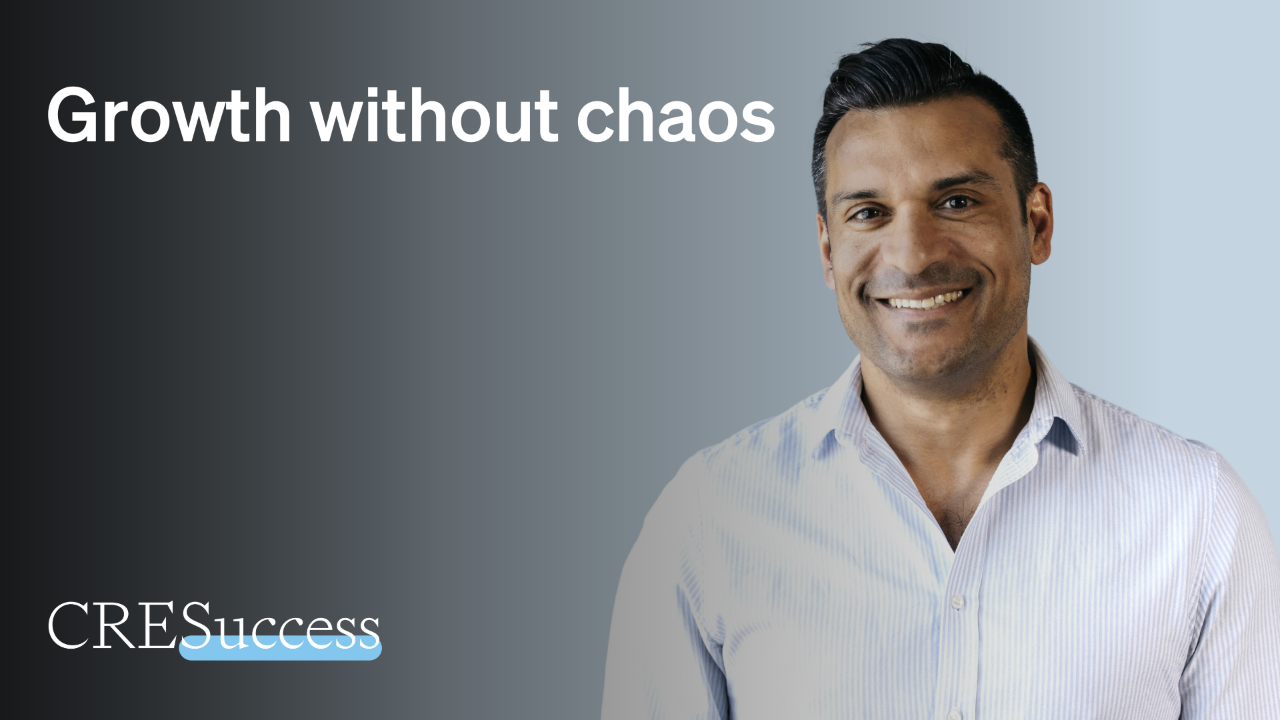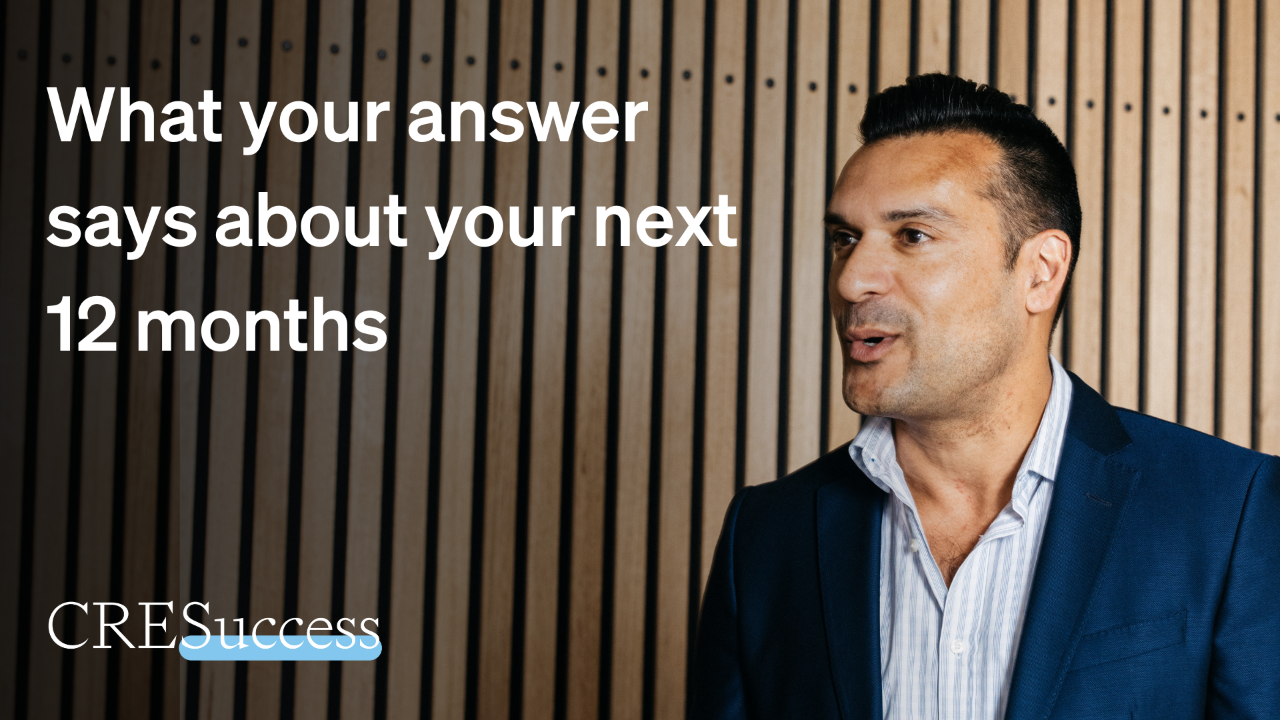How to scale your commercial real estate business without chaos.
Oct 15, 2025
CRE Success Principle: Every process you document is an investment. Systems don’t just save time; they create consistency, accountability, and predictability, which builds the foundation for scalability.
If you’ve built a strong foundation in your commercial real estate business but feel like you’ve hit a ceiling, you’re not alone.
Many principals reach a point where they want to grow but fear that growth will mean more chaos.
The truth is, scaling doesn’t have to feel overwhelming. It starts with three key levers: systems, people, and smart strategic moves.
Systemise for consistency
Every process you document today will pay you back in time, profit, and peace of mind. Systemisation turns chaos into clarity and helps your business run predictably, even when you’re not there to steer every task.
Empower your people
Growth happens when you delegate effectively. Hiring the right people, even if they’re not immediately revenue-generating, creates capacity for you and your top performers to focus on higher-value work.
Expand strategically
Before chasing new opportunities like acquisitions or new offices, ensure your core business runs smoothly. If your systems and culture can’t handle more load, growth will only add stress.
Scaling should make your life easier, not harder. When you build on solid foundations, your business becomes lighter, more profitable, and more enjoyable to run.
Listen to episode 242 of Commercial Real Estate Leadership to learn how to scale smarter and grow stronger.
Episode transcript:
What does scaling your commercial real estate business actually look like?
If you're like most commercial real estate principals, you've already built something solid. You've got a foundation with clients and recurring revenue and a bit of a team in place, but maybe you're feeling like you've hit a ceiling.
Deep down, you want to grow.
But also, you're hesitant because you don't want more chaos, and growth represents pain or chaos.
You might have heard of the pain line — Dan Martell talks about it — and he says that if growing your business is going to cause you more pain, then you won't do it because we don't grow into pain.
So, what we need is three levers that can create sustainable growth in a commercial real estate business.
I want to give you those levers today — those levers are systems, people, and the right strategic moves.
This is episode 242 of Commercial Real Estate Leadership. We're the show that's helping you lead better, grow faster, and stress less.
And I don't say this to give you any stress, but you know there's only ten weeks left until Christmas. Isn't that wild?
How long does the campaign run? Less than ten weeks.
How long does it take to turn a lead into a client? Less than ten weeks.
Could you turn a lead into a transaction between now and Christmas?
Definitely you can, but the runway is getting shorter and shorter every single day.
So, now's the time to start thinking about what it is that you want to get done between now and the end of this year.
By the way, my name's Darren Krakowiak, and by the end of today's conversation, you're going to have a practical checklist to get to the next phase of growth — not between now and Christmas, but more about medium- to long-term growth in a profitable and peaceful way.
Because we're taking a look at the systemization dividend, how to create leverage through the right hires and people in your business, and the strategic moves required to help you break through plateaus and hit the next phase of growth in your business.
And I want to get right into it today.
We're starting off with systems because this is where scale actually starts.
Every process that you take the time to document today is going to eventually pay you back in time, profit, and peace of mind.
Yes, it does take some time to document a process, but once it's documented and can be followed by somebody else, then you don't have to do it anymore.
The best-performing agencies that I work with are not necessarily the biggest, but they're the ones that have the best systems because they know how things are done, they know who's responsible, and they've got a way to measure success.
So, think about all of the little things that are happening in your business every single week.
Things like handing over an opportunity to property management after a transaction is done.
Things like vendor reporting, updating a vendor on the status of a campaign, or onboarding new property management clients.
If you can create a repeatable process for those, you're not just saving time — you're creating consistency and accountability.
So, I want to give you a simple framework to start with this.
Just pick one recurring process in your business — maybe one of those examples I mentioned, or maybe you've got some even lower-hanging fruit that you can pick.
Write down the exact steps that are involved in that process, and then assign clear leadership for handling that process.
That's it, right? It can be as simple as a checklist.
A process is documented, simplified — simple enough that someone in the position of responsibility can take it — and then it's followed.
So, we've got to make sure people are actually following the process. So that's as simple as it can be.
One of my clients in our group coaching program for commercial real estate principals recently demonstrated how he's using Monday.com to manage all the processes in his business.
It's a fantastic way to document processes if you've got a number of them.
Of course, it can be very simple — just a checklist — but if you're more advanced, I think that's a good way to start documenting and using automation, linking it with your CRM to make the processes and systems work harder for you, not the other way around.
Because when your business is running on a set of tracks — think of train tracks — it can move faster.
You don't have to push it as hard or get it back on track when things go off the rails when you've got systems and processes that keep everything aligned.
So that's systems.
Next one is people.
And I want to talk about hiring — and hiring in a way that's perhaps a little bit counterintuitive to growing revenue in your business.
No matter how good your systems are, if you don't have the right people running them, then the systems aren't of much use.
And you can't scale a business that relies on you for every decision, for every deal, and for solving every problem.
So, the goal is to build a structure where everyone knows what success looks like — and you're kind of like the conductor, right?
Not the train conductor from the last metaphor, but the conductor of the band.
You're not a member of the band playing an instrument, but you're at the front, making sure everything is working in unison and everyone is playing their role.
Now, the counterintuitive thing about hiring is the amount of growth that can be unlocked in your business by hiring someone who doesn't actually have any revenue against their name.
Hiring someone junior who can take admin, research, and servicing small properties off your plate, so you can focus on leadership and higher-value activities — and so your rainmakers can do the same.
A common rule of thumb in commercial real estate is that we want employees to contribute at least three times their base salary back to the business in revenue that they produce.
That means some principals are reluctant to hire junior resources when that payback rate is not clear — like, how is this person hired for $60,000 going to make $180,000 for the business?
But I think if you find someone with the right attitude and someone who can create capacity within the business, you can easily create $200,000 in extra revenue when they're working on things that free up a lot of your time to do the things that only you can do, instead of you doing all the things that someone else could do just as well if you showed them how to do it.
So, think of all the things that you're currently doing that somebody else could do if you just showed them.
Once you've got enough of those things that you could also have a process around, you can then hand over that process to a hire and reallocate your time to doing more of the dollar-productive, revenue-generating tasks that are going to grow revenue by at least three times more than the cost of that junior resource.
Because when you delegate effectively, you don't just create time — you create capacity for growth.
Now I want to talk about one more growth lever that I've been discussing with clients recently, and that is strategic moves.
This is expanding without overextending.
Some of the conversations I've been having with clients recently are quite wide-ranging, including acquisitions of rent rolls, starting up new service lines, opening new offices, and a couple of clients who've been looking at rebrands.
So, these are topics that have come up with my clients that are quite exciting and certainly they can be a way to fast-track growth.
But it's only going to fast-track growth if your foundation is strong.
So, before you say yes to any big strategic moves, pause and think about these three key questions:
- Does this align with my long-term vision?
- Do we have the systems to absorb this change?
- Will this dilute my focus, and can I handle that? Do I have the team in place to handle that dilution in focus?
Because not every opportunity is going to drive more growth. Some are actually distractions wearing opportunity’s clothes — like a wolf in sheep's clothing.
If your core business still relies on you to function, doubling the size of the business is only going to double your stress.
Big strategic moves do sometimes come with leverage or know-how that's inbuilt — systems you acquire or people you bring on board — but you’ll still need to acquire skills to drive that new machine.
And if you've already got systems in place, and you're hiring people and have them working on the right things, you're going to be better placed to drive that new Ferrari you've just got your hands on.
Get existing systems in place, have a team that's already accountable, and a culture that's clear to make sure you can grow without breaking or causing new problems that you're not equipped to handle once you make this strategic move.
Before you make the move, just make sure you've got the processes and people to handle it.
I just want to bring this all together in terms of what we've been talking about today.
It's a bit of a playbook for smarter scaling, and it really comes down to three things:
- Systemize for consistency. When your business runs on structure, you unlock predictability, and predictability creates profitability.
- Empower your people. Hire intentionally, delegate clearly, and trust your team to deliver. Remember, your role is like the conductor — you’re there to lead, not to play the instruments, not to do.
- Expand strategically. Grow when your systems, culture, and people can handle the load. Not every opportunity aligns with your long-term plan. Your short-term excitement might not be aligned with the long-term plan for the business.
So, this is how you scale, but scale sustainably.
Yes, we can hustle and do some things between now and the end of the year to create a bit of activity between now and then, but we don't want to add chaos when we're making bigger moves that drive fundamental, underlying growth capacity of our business.
We want to grow faster, but also grow stronger because we've got the foundations in place.
When you get this right, the business feels less heavy and starts to flow better.
If you're ready to scale your business in a smarter way — with the right structure, less stress, and a stronger team — I’d love to help you.
Send me a message on LinkedIn and DM me the word “GROW,” or visit cresuccess.co/leadership for more information about how we help commercial real estate principals to lead their people better, to grow their business faster and to have less stress in their lives.
If you got value from today's episode, please share it with another commercial real estate principal or leader who's building something big.
That’s our episode for today. Thank you so much for listening. I’ll speak to you soon.








